Why frequent urination occurs in women
The amount of urine filtered by the kidneys from blood plasma depends on many factors. This is the total volume of circulating blood in the body, the intake of fluid with food and drink, environmental conditions, the state of the kidneys. When the bladder is full, a person feels the urge to urinate, but various external causes or pathological conditions of the organ can make the desire to urinate more frequent or rare. Therefore, it is difficult to talk about the exact number of urination acts per day, each person has his own norm. On average, as is commonly believed, it is 6-10 times, of which 1-2 times per night.
Why frequent urination occurs in women
It is worth talking separately about the features of the female urinary organs. Indeed, due to their anatomical structure, as well as due to differences in the internal organs that make up the small pelvis, the causes of pathology in men and women differ. But, of course, there are factors that cause frequent urge to urinate in women with the same probability as in male patients.

Excessive drinking or diuretic decoctions will surely lead to increased urination.
First of all, these are infectious diseases that affect all parts of the urinary system and are caused by specific or nonspecific microflora. In second place is urolithiasis, which has characteristic manifestations in both sexes. In addition, there are many physiological or natural causes that cause frequent urination in women and men. Also, some drugs and herbal remedies that have a diuretic effect lead to an increase in urine volume, causing frequent and profuse urination.
During pregnancy, when the enlarged uterus compresses and displaces the bladder, its nerve receptors are almost constantly in an excited state. Therefore, if a woman does not have time to run to the toilet, urinary incontinence may also occur. But this symptom, like increased urination in a pregnant woman, is also considered physiological.
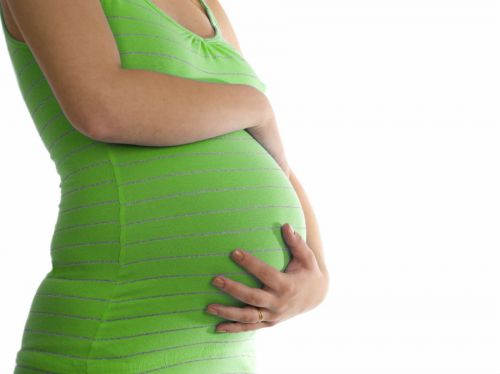
Is it normal to go to the bathroom often during pregnancy?
There is also a complex of diseases of internal organs that directly or indirectly affect the process of urination and can change its frequency. Here, some differences already appear in patients of the stronger and weaker sex, associated with anatomical features. First of all, these are gynecological pathologies, as well as hormonal disorders that have appeared in elderly patients due to menopause.
There are many factors that cause increased urination in women.
What diseases cause frequent urination
The frequent need to empty the bladder in most cases does not bother a woman as much as the appearance of accompanying symptoms. It often happens that the patient tries to "endure" this temporary, as she thinks, phenomenon, or for some time does not even notice that going to the toilet has become more frequent. But the appearance of other pathological signs still makes her seek medical help.
The most important accompanying symptom is the appearance of pain. The time of its occurrence, localization and nature are very significant for diagnosis. But there are also diseases that, leading to an increase in the number of acts of urine excretion, are not accompanied by pain. .
Frequent urination in women with pain is noted in many pathologies:
- inflammatory diseases of the urinary tract;
- inflammatory diseases of the genital organs;
- traumatic damage to the mucous membrane of the genital tract;
- urolithiasis disease.
Penetration of pathogenic microflora into the urethra and further ascending into the bladder and kidneys in women occurs more often than in men. This is facilitated by a wide and short urethra, as well as the proximity of other natural openings: the vagina and anus. All bacteria that can cause an inflammatory process are divided into specific and nonspecific. The most common culprits of inflammation in the urinary tract are E. coli, streptococci, Pseudomonas aeruginosa and Haemophilus influenzae, staphylococci. Less often - specific flora: chlamydia, gonococci, Trichomonas.
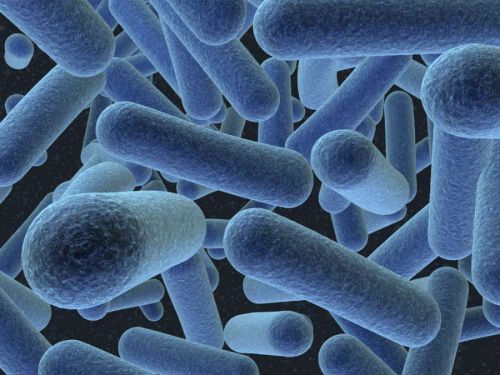
Pathogenic microorganisms most often cause diseases of the urinary tract
The localization of the pathological process in the organs of the urinary system causes the appearance of a certain nosology (or disease). This means urethritis, cystitis, pyelonephritis, and combinations of these pathologies are also found. At the same time, along with there are other signs.
So, inflammation of the mucous membrane of the urethra is accompanied by a feeling of discomfort, itching or cramps, not only at the time of the release of urine, but also at rest. And pyelonephritis, a serious lesion of the renal parenchyma, or cystitis, inflammation of the mucous membrane of the bladder, in case of an acute course, are combined with an intoxication syndrome. The patient, noting frequent urination and burning or pain in the lower abdomen, complains of worsening general condition. Her body temperature rises, appetite disappears, there is a sharp weakness and malaise, often there are dizziness.
The combination of frequent urination in women with other pathological symptoms can also occur with some diseases of the genital area. So, inflammatory processes in the vagina (vaginitis) or cervix (colpitis), caused by nonspecific, specific or fungal flora (thrush), in addition to various secretions, are also characterized by dysuric disorders.
Non-inflammatory diseases, such as uterine fibroids or prolapse, can also lead to disturbances in the normal excretion of urine, but much later than the main symptoms. In the initial stages, changes in the menstrual cycle develop, pains appear in the lower or middle part of the abdominal cavity, with myoma, bloating and bleeding from the vagina are possible. With frequent urination, which occurs due to displacement of the bladder in the later stages of these pathologies, a slight pain syndrome is also characteristic.
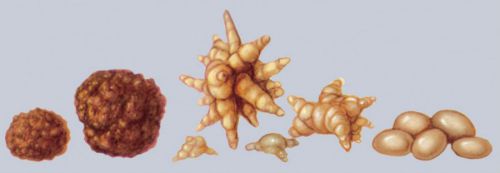
The movement of conglomerates in urolithiasis causes frequent and painful urination
Traumatic injuries, as a result of which the integrity of the mucous membranes of the urethra or bladder is violated, are also manifested by pain with frequent urination. As a rule, the excretion of urine occurs with blood, and the addition of a secondary infection also causes the appearance of an admixture of pus.
Painful and frequent urination in urolithiasis is due to the presence of mineral crystals in the urinary tract, which exist in the form of sand or stones. With their sharp edges, they injure the epithelial layer, causing attacks of renal colic, pain and pain when excreting urine.
Very frequent urination in women with pain syndrome, slightly pronounced, differs in the initial stage of diabetes mellitus, as well as diabetes insipidus. Along with increased thirst, dryness and itching of the skin, the appearance of constant weakness and increased fatigue, patients complain of an almost constant desire to go to the toilet, especially at night and in the morning. Diabetes insipidus is characterized by a sharp increase in the amount of urine excreted.
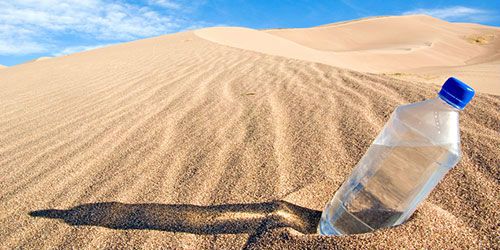
Intense thirst in diabetes accompanies frequent urge to urinate
How to treat frequent urination
It is possible to get rid of this unpleasant and very affecting the quality of life phenomenon only when it is possible to accurately determine its cause. After all, this is not a disease, but only a symptom that is characteristic of many pathologies that have different treatment tactics. The most important thing is to notice the appearance of frequent urges, even when they are not yet accompanied by other symptoms, and understand that the situation is not normal. As soon as this happens, the next thing to do urgently is to seek medical help from specialists.
The first visit to the clinic with complaints about frequent visits to the toilet is a consultation with a local therapist. After listening to the patient and clarifying the nature of the pathological signs, the doctor performs a general examination. An assessment of the skin and mucous membranes, palpation of the lymph nodes, auscultation (listening) of the lungs and heart, palpation and percussion (tapping) of the abdominal organs is carried out. During the examination, the doctor determines the presence of pain points. Then the doctor prescribes a laboratory test of blood and urine, sends for a consultation to a gynecologist, nephrologist, urologist, if necessary, to an endocrinologist.
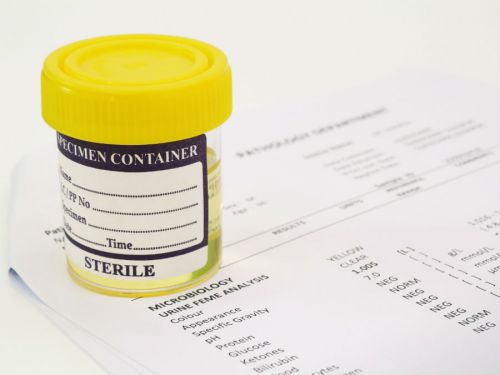
In case of dysuric disorders, a urinalysis is mandatory
After examination, including instrumental, it is already possible to determine exactly what disease a woman manifests with frequent painful urination. Depending on which part of the urinary system or internal organ suffers, a woman begins to be treated by a specialist of the appropriate profile.
Of course, treatment tactics for each pathology has its own characteristics. So, infectious diseases require the appointment of antibacterial drugs, means to strengthen the immune system, painkillers, antispasmodic drugs. Endocrine pathologies, in which frequent urges are noted, can, if not completely cured, then get rid of some symptoms by using hormonal drugs with a substitution purpose.
A radical (surgical) method of therapy is also used. So, with urolithiasis, if it is not possible to dissolve and remove stones by conservative methods, then various methods of lithotripsy or removal of stones with endoscopic instruments are used. Treatment of such gynecological diseases as prolapse, prolapse or uterine fibroids, in most cases, is only surgical.

Sedentary baths with medicinal decoctions are one of the additional methods of therapy.
It is impossible to try to normalize the acts of urination in isolation from the underlying pathology. Only the treatment of the main cause, and not a single symptom, will help get rid of it. Along with medical, physiotherapeutic and surgical methods, various alternative methods are also widely used. They help reduce the intensity of the inflammatory process, relieve pain, and restore normal bladder emptying. Treatment of frequent urination in women with folk remedies includes:
- herbal decoctions and infusions;
- compresses from vegetable raw materials;
- thermal procedures;
- medicinal baths.
For the preparation of decoctions or infusions, stigmas of corn, cherry stalks, poplar buds, centaury, yarrow, St. John's wort are used. In pharmacies, ready-made medical fees are sold. Thermal procedures can only be carried out at normal body temperature and on medical advice. Local heat on the lower abdomen is a compress of grated onions wrapped in gauze, as well as bags of hot salt, melted paraffin cakes or boiled potatoes. For the preparation of therapeutic baths, it is recommended to use herbal antiseptics: pharmacy chamomile, mint, calendula, sage.
In most cases, patients manage to normalize urination and its accompanying phenomena. Important conditions are an early visit to the doctor and adequate complex therapy.




